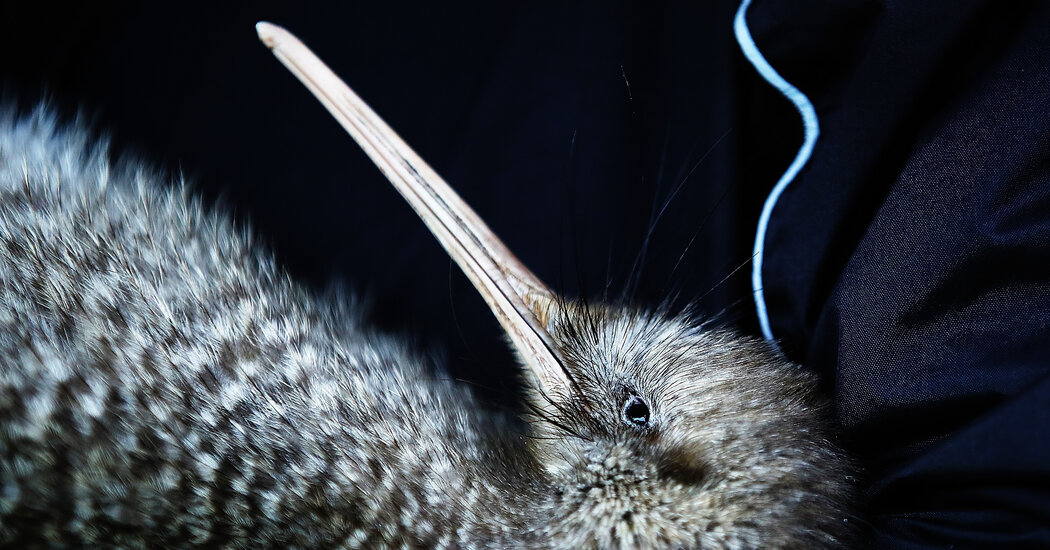Global Courant 2023-05-26 03:18:59
Shy and withdrawn by nature, with a preference for solitude and the dark, few would describe Paora, 4, as a natural diplomat.
Yet this Miami-based kiwi — one of about 60 of the ratites living in zoos outside their native New Zealand — has been forced into the international spotlight, literally and figuratively.
Footage of Paora being petted by zoo visitors under fluorescent lighting has caused a stir in New Zealand, where it is common knowledge that the national bird is nocturnal and should only be handled by experts. Zoo Miami apologized this weeksaying it would no longer allow members of the public to touch him.
“I immediately went to the zoo director and said, ‘We have offended a nation,'” Ron Magill, a spokesperson for the zoo, told Radio New Zealand on Wednesday.
The episode exposed the potential pitfalls of what you might call “kiwi diplomacy”: New Zealand’s practice of sending kiwis to foreign zoos, much as China more famously does with pandas.
Paora’s video, posted on social media, showed him being scratched and petted around his neck and face by a zookeeper and members of the public. More than 10,000 people, many of them New Zealanders, have since signed a petition calling for the zoo to end its “Kiwi Encounter” program, which allowed visitors to interact with the bird.
Even Prime Minister Chris Hipkins had to weigh in. “They have recognized that what they were doing was not appropriate, not right or not fair to the kiwi,” he said of the zoo on Wednesday. “That’s really all we can ask of them.”
For decades, the kiwi has played a small but important role in New Zealand’s relations with other countries. Similar to China’s “panda diplomacy,” the idea is to celebrate bilateral ties and improve breeding outcomes for captive populations.
The rules in New Zealand are slightly less strict than those in China, but there are certain requirements for participating zoos. Kiwi who must be dead repatriated to New Zealand for burial. Since 2010, feathers shed by kiwis at the Smithsonian’s National Zoo in Washington, DC, have been collected and returned to New Zealand as “taonga,” the Maori word for treasure.
Kiwis have been at the Washington Zoo since 1968, when then-Prime Minister Keith Holyoake personally presented the facility with two of the birds. Ten years later another breeding pair was added to the Frankfurt Zoowhere they and their descendants have produced dozens of long-beaked offspring.
New Zealand’s program has never received as much attention as China’s, but New Zealand’s leaders have been keeping a close eye on the birds’ diplomatic potential. In 2010, then Prime Minister John Key suggested that kiwi could be traded for pandas. “I know people pay $10 million, but we are a special friend of China, why can’t we give them kiwis?” he told local news media at the time. “Two for two, kiwis are worth a lot.” (So far, anyway, that hasn’t happened.)
Paora is related to two birds named Tamatahi and Hinetu, who were presented to the Washington Zoo in 2010, as part of a plan to inject more genetic diversity into small captive kiwi populations.
He was transported to Miami as an egg in 2019 and was given his name later that year in a ceremony by visiting representatives from New Zealand, including Rosemary Banks, the ambassador to the United States.
But since the release of the Kiwi Encounter video, New Zealanders, including Paora Haitana, the bird’s namesake and an environmentalist and Maori leader who was part of that visiting group, have I wonder if it is well taken care of at his home in Florida.
Hilary Aikman, a top official with New Zealand’s conservation department, said in a statement this week that the department would raise concerns with the zoo “to try and improve the housing and treatment situation.” Mr Magill, the zoo’s spokesman, admitted to Radio New Zealand that it had “made a big mistake”. (“Please know that Paora is normally kept out of public view in a quiet environment,” the zoo said in its apology.)
Animal diplomacy has played a role in the foreign policy of several countries for centuries and often includes provisions for the care of the animals, said Nancy Cushing, a researcher at the University of Newcastle in Australia.
“There’s a reflected glory to both the person who gave the gift and the recipient of having something so exotic and eye-catching,” she said. “It strengthens power on both sides and solidifies the relationship between the two rulers or governments.”
But things can go wrong, said Dr. Cushing’s, especially when expectations of how an animal will be cared for are not met.
“It’s like other forms of diplomacy — it can fail,” she said.








